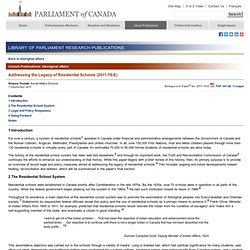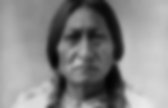

Residential Schools. Canada apologizes for residential school system. Canadian Indian residential school system. Stories of residential school survivors. The young girl, whose mother had died in childbirth, was being cared for by her aunt and uncle.
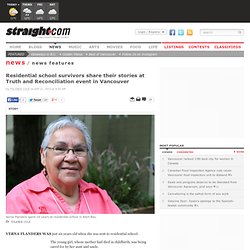
“But I came into the wrong hands when I was six,” Flanders told attendees at the Truth and Reconciliation Commission this week. As TRC commissioners Marie Wilson and Chief Wilton Littlechild listened, Flanders described the sense of sheer isolation and loneliness that she felt as a boarding student at St. Michael’s Indian Residential School in Alert Bay. For 10 years, she missed out on typical childhood experiences, like knowing what it was like to celebrate a birthday, or going home to see her family for Christmas. She grew up without parents, spending a decade of her life, as she remembers it, “behind brick walls”. “I felt so alone,” she said, through tears. As Flanders shared her story, her sons sat on either side of her, reaching over at times to place a comforting hand on her shoulder. A history of residential schools in Canada - Canada.
What is a residential school?
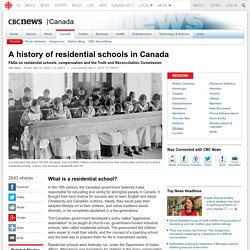
In the 19th century, the Canadian government believed it was responsible for educating and caring for aboriginal people in Canada. It thought their best chance for success was to learn English and adopt Christianity and Canadian customs. Ideally, they would pass their adopted lifestyle on to their children, and native traditions would diminish, or be completely abolished in a few generations. Justice for All? On June 11, 2008, in the Parliament of Canada, Prime Minister Stephen Harper apologized on behalf of all Canadians for “the policy of assimilation” and the terrible pain and suffering endured by aboriginal peoples, including Inuit, who attended Indian residential schools and hostels in Canada.
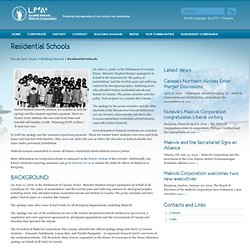
The prime minister said this policy “had no place in a country like Canada.” The apology by the prime minister and the other elements of the Residential Schools Settlement Act, are historic achievements, but there also remains unfinished residential school business, especially within Nunavik. Several hundred Nunavik residents are excluded by both the apology and the common experience payment.
These are former foster students who were sent from home and boarded with families. They were not under the care of either the churches or federal schools, but came under provincial jurisdiction. Aboriginal law rising. Keith Bergner, another Vancouver lawyer who focuses on aboriginal law, tells a similar story.
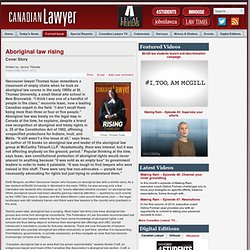
As a law student at McGill University in Montreal in the early 1990s, he was among only a few interested law students who showed up for “poorly attended elective courses” on aboriginal law. While aboriginal issues had been steadily gaining national attention — sparked by such events as the 1990 Oka crisis in Quebec and the failed Meech Lake accord that same year — the legal landscape was still relatively barren and there were few lawyers in the country who practised in the area. Twenty years later, aboriginal law is surging. Most major law firms now have aboriginal law groups and some hire aboriginal consultants.
The Federation of Law Societies recommended last year that all new lawyers called to the bar have some knowledge of aboriginal rights. Canada’s Aboriginal education crisis [ Column] Author: By Robert Laboucane Guest Columnist With a national labor shortage upon us across Canada, some employers are expecting the availability of qualified Aboriginal employees to be part of the solution.
![Canada’s Aboriginal education crisis [ Column]](http://cdn.pearltrees.com/s/pic/th/aboriginal-windspeaker-68746248)
Aboriginal people want to be included. From industry’s perspective, they must be included. National Inuit Leader Mary Simon, president of Inuit Tapiriit Kanatami, joined forces with Canada’s four other Aboriginal leaders and provincial and territorial premiers on Aug. 4 this year to ask Prime Minister Stephen Harper to convene a First Ministers’ Meeting on Aboriginal education within a year. Today there are 518 schools on First Nations reserves in Canada. So, why is this not happening? Parents of First Nations students on reserves express the fear that their children are failing to develop a positive sense of their identity and that curricula rarely reflects their children’s true history, diverse cultures and languages and their contributions to Canada. Related Content. About Residential Schools. From the early 1830s to 1996, thousands of First Nation, Inuit and Métis children were forced to attend residential schools in an attempt to assimilate them into the dominant culture.
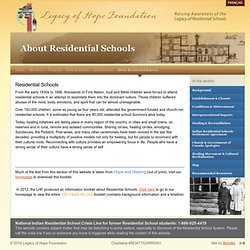
Those children suffered abuses of the mind, body, emotions, and spirit that can be almost unimaginable. Current Publications: Aboriginal affairs: Addressing the Legacy of Residential Schools (2011-76-E) 1 Introduction.
